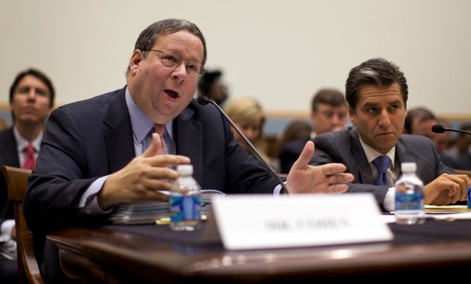
David Cohen, Executive Vice President, Comcast Corporation, left, testifies with Robert Marcus, Chairman and CEO, Time Warner Cable at a hearing on the proposed merger of the two companies. // Carolyn Kaster/AP
related stories
As Comcast Corp. tries to convince the federal government to permit it to buy Time Warner Cable Inc. for $45 billion, opponents of the deal will inevitably bring up people like Ed.
Every morning at 8:15, Ed climbs into his red, 1999 Mazda sedan and drives 15 miles down Main Street in Scranton, Pa. He passes mom-and-pop sandwich shops, a shuttered elementary school and a computerized shooting gallery for archery on his way to a friend’s 86-year-old house where coal miners once lived — and where there’s an Internet connection.
Ed, who comes here because he can’t afford the parking fees at a library six miles away, first reads his email and then turns his attention to job sites such as snapjobsearch, glassdoor, Monster and Craigslist. He’s been following this routine for nearly four years, looking for an opening in the hotel or restaurant business where he’s got some experience, but he has yet to land a job. Without the Internet connection, he’d have no hope.
“You can’t walk into a Wal-Mart without filling out an application online first,” said Ed, who doesn’t want to use his last name because he fears employers may avoid hiring him. “The Internet today is like electricity. If you don’t have it, you’re screwed.”
Ed wouldn’t have to rely on the goodwill of friends and make the daily 30-mile round trip if Comcast, the only fast, wired broadband provider in the Scranton area, offered its low-priced Internet service to people like him. But the $9.95-a-month program, called Internet Essentials, is available only to low-income families with school-age children.
Not for everyone
Ed, 53-years-old and single, isn’t eligible, even though he’s living on $169 a month in food stamps and the generosity of family and friends.
Comcast offered Internet Essentials shortly before its last big acquisition, when it bought NBC Universal in 2011. To ease federal approvals of the transaction, the company promised that it would offer low-priced Internet connections and computers to low-income families. But the Federal Communications Commission, which approved the merger, didn’t set any participation requirements, or metrics to define success.
Now the cable and broadband giant, wants to buy Time Warner Cable, and again in an attempt to show regulators the deal is in the public interest, is offering to extend the program indefinitely and offer it to all Time Warner’s customers too. The deal, if approved, will give Comcast control of about 40 percent of U.S. Internet users.
The program makes for good public relations, but its real impact on the persistent problem of low-broadband adoption rates among the poor is negligible and is a weak substitute for a national strategy, advocates say.
Of the 7.2 million low-income people in Comcast’s service area, only 2.6 million are eligible for Internet Essentials, according to data compiled by the Center for Public Integrity. The program requires the participant’s household to include a child who is eligible for the federal school lunch program. Of that 2.6 million, only 300,000, or 12 percent, have signed up since Internet Essentials was launched in 2011.
No comments:
Post a Comment